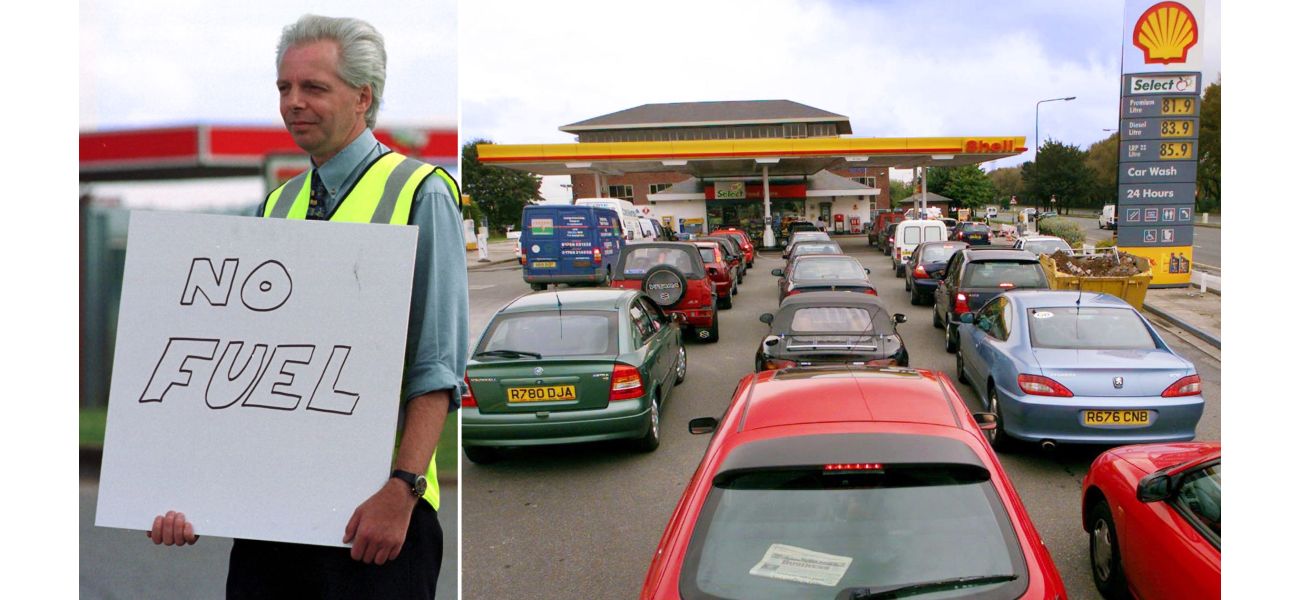Fuel protests once paralyzed the UK for a week and there are concerns that it could happen again.
An expert has predicted the 'fuel protest' of our generation.
September 15th 2024.

In the year 2000, amidst all the celebrations of the new millennium, the UK was faced with a major crisis - a severe shortage of fuel. It was a time of great turmoil as petrol pumps ran dry and supermarkets struggled to keep their shelves stocked. This fuel crisis was the result of angry truckers and farmers taking a stand against the high prices of petrol that were affecting their livelihoods.
The protests began in September of 2000, with the blockade of petrol refineries, starting at Stanlow in Cheshire. The protestors, who were determined to make their voices heard, made sure to allow emergency services to access fuel and made a pledge to remain non-violent. However, as the days went by, the protests spread to other locations, causing massive traffic jams and long queues at petrol stations. Even central London was not spared from the chaos, as convoys of lorries and tractors caused disruptions on the roads.
The fuel protests were a result of mounting frustration among British farmers and hauliers over the high fuel duty rates. Despite their demands for a cut in the duty rate, the government, under Tony Blair, refused to take action. This led to a campaign of direct action that gained the attention and envy of other activists.
As the protests intensified, panic buying among motorists only made matters worse. Supermarket shelves were left empty as the protestors blocked access to oil facilities, leading to a week's worth of fuel being sold in just three days. It was a chaotic scene, with long queues at petrol stations becoming a common sight.
The success of the fuel protests was evident when, less than a month later, Chancellor Gordon Brown announced a freeze on the fuel duty and a reduction in the vehicle excise duty. This was a major victory for the protestors, who had managed to bring the nation to a standstill in a matter of days.
Some were left wondering how the hauliers had managed to gain the cooperation of the powerful oil industry and the police, without facing any repercussions. Animal rights activists, in particular, were in awe of their ability to achieve such a feat.
But the question remained - could we see another fuel protest in the future? While there were some attempts in 2005 and 2007, they did not have the same impact as the 2000 campaign. However, according to Professor Matthew Paterson, a specialist in environmental politics, the transport sector continues to be a central issue in environmental protests.
He believes that the next flashpoint for protests could be over electricity pylons, as the country moves towards electrifying cars and home heating. This would lead to a significant increase in electricity demand, requiring a massive expansion of the grid and the installation of more pylons. It is a situation that could potentially spark a similar backlash as the fuel protests.
The fuel duty, along with the VAT, makes up the tax on fuel for road use. It is applied at a fixed amount per litre, with the VAT being added as a percentage of the fuel cost. This increase in fuel duty had a significant impact on farmers, with one stating that he had not made a profit in four years. By the year 2000, the UK's fuel prices had gone from being among the cheapest in Europe to one of the most expensive, making it difficult for the haulage industry to remain competitive.
In conclusion, the fuel protests of 2000 were a manifestation of the frustration and discontent among British farmers and hauliers over the high fuel prices. It was a time of great disruption and chaos, but it also led to a significant victory for the protestors. As we move towards a more environmentally conscious future, it remains to be seen if we will witness another fuel protest or if the focus will shift to other concerns, such as the impact of electrification on the electricity grid.
The protests began in September of 2000, with the blockade of petrol refineries, starting at Stanlow in Cheshire. The protestors, who were determined to make their voices heard, made sure to allow emergency services to access fuel and made a pledge to remain non-violent. However, as the days went by, the protests spread to other locations, causing massive traffic jams and long queues at petrol stations. Even central London was not spared from the chaos, as convoys of lorries and tractors caused disruptions on the roads.
The fuel protests were a result of mounting frustration among British farmers and hauliers over the high fuel duty rates. Despite their demands for a cut in the duty rate, the government, under Tony Blair, refused to take action. This led to a campaign of direct action that gained the attention and envy of other activists.
As the protests intensified, panic buying among motorists only made matters worse. Supermarket shelves were left empty as the protestors blocked access to oil facilities, leading to a week's worth of fuel being sold in just three days. It was a chaotic scene, with long queues at petrol stations becoming a common sight.
The success of the fuel protests was evident when, less than a month later, Chancellor Gordon Brown announced a freeze on the fuel duty and a reduction in the vehicle excise duty. This was a major victory for the protestors, who had managed to bring the nation to a standstill in a matter of days.
Some were left wondering how the hauliers had managed to gain the cooperation of the powerful oil industry and the police, without facing any repercussions. Animal rights activists, in particular, were in awe of their ability to achieve such a feat.
But the question remained - could we see another fuel protest in the future? While there were some attempts in 2005 and 2007, they did not have the same impact as the 2000 campaign. However, according to Professor Matthew Paterson, a specialist in environmental politics, the transport sector continues to be a central issue in environmental protests.
He believes that the next flashpoint for protests could be over electricity pylons, as the country moves towards electrifying cars and home heating. This would lead to a significant increase in electricity demand, requiring a massive expansion of the grid and the installation of more pylons. It is a situation that could potentially spark a similar backlash as the fuel protests.
The fuel duty, along with the VAT, makes up the tax on fuel for road use. It is applied at a fixed amount per litre, with the VAT being added as a percentage of the fuel cost. This increase in fuel duty had a significant impact on farmers, with one stating that he had not made a profit in four years. By the year 2000, the UK's fuel prices had gone from being among the cheapest in Europe to one of the most expensive, making it difficult for the haulage industry to remain competitive.
In conclusion, the fuel protests of 2000 were a manifestation of the frustration and discontent among British farmers and hauliers over the high fuel prices. It was a time of great disruption and chaos, but it also led to a significant victory for the protestors. As we move towards a more environmentally conscious future, it remains to be seen if we will witness another fuel protest or if the focus will shift to other concerns, such as the impact of electrification on the electricity grid.
[This article has been trending online recently and has been generated with AI. Your feed is customized.]
[Generative AI is experimental.]
0
0
Submit Comment





